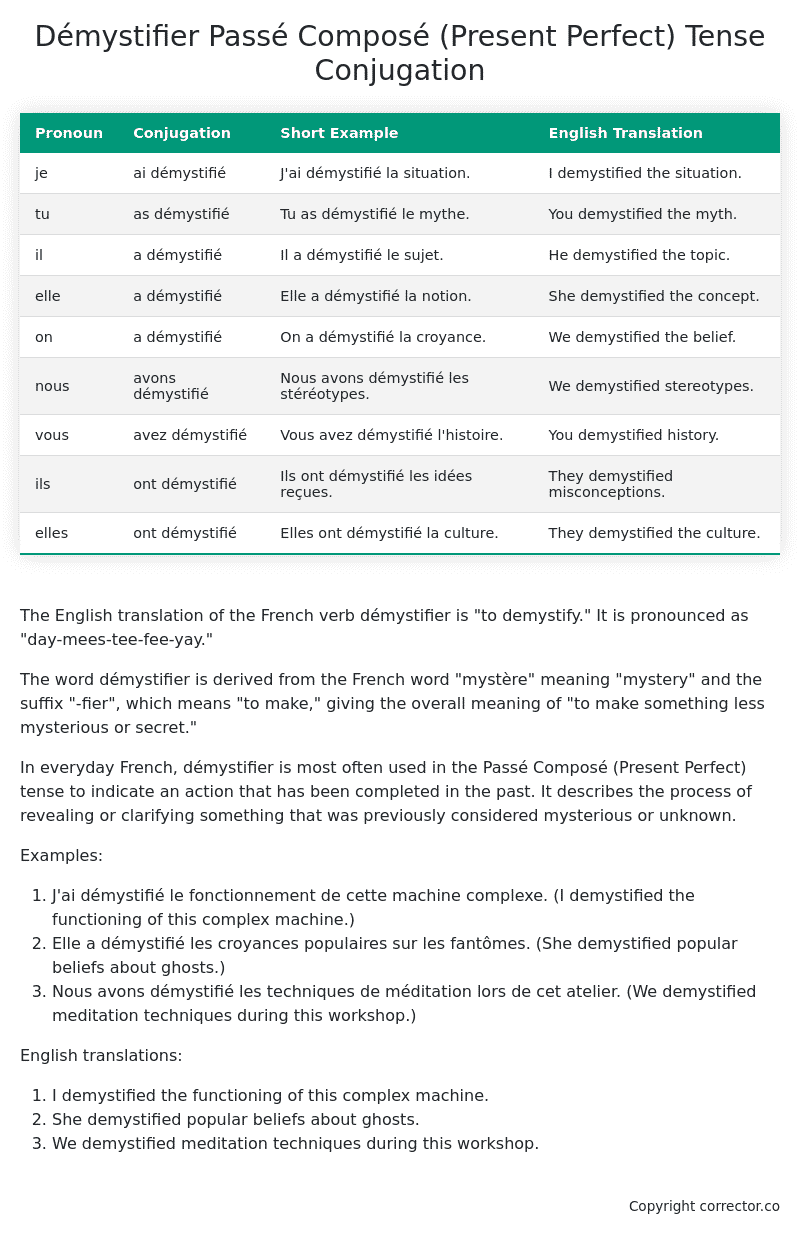Passé Composé (Present Perfect) Tense Conjugation of the French Verb démystifier
Introduction to the verb démystifier
The English translation of the French verb démystifier is “to demystify.” It is pronounced as “day-mees-tee-fee-yay.”
The word démystifier is derived from the French word “mystère” meaning “mystery” and the suffix “-fier”, which means “to make,” giving the overall meaning of “to make something less mysterious or secret.”
In everyday French, démystifier is most often used in the Passé Composé (Present Perfect) tense to indicate an action that has been completed in the past. It describes the process of revealing or clarifying something that was previously considered mysterious or unknown.
Examples:
- J’ai démystifié le fonctionnement de cette machine complexe. (I demystified the functioning of this complex machine.)
- Elle a démystifié les croyances populaires sur les fantômes. (She demystified popular beliefs about ghosts.)
- Nous avons démystifié les techniques de méditation lors de cet atelier. (We demystified meditation techniques during this workshop.)
English translations:
- I demystified the functioning of this complex machine.
- She demystified popular beliefs about ghosts.
- We demystified meditation techniques during this workshop.
Table of the Passé Composé (Present Perfect) Tense Conjugation of démystifier
| Pronoun | Conjugation | Short Example | English Translation |
|---|---|---|---|
| je | ai démystifié | J’ai démystifié la situation. | I demystified the situation. |
| tu | as démystifié | Tu as démystifié le mythe. | You demystified the myth. |
| il | a démystifié | Il a démystifié le sujet. | He demystified the topic. |
| elle | a démystifié | Elle a démystifié la notion. | She demystified the concept. |
| on | a démystifié | On a démystifié la croyance. | We demystified the belief. |
| nous | avons démystifié | Nous avons démystifié les stéréotypes. | We demystified stereotypes. |
| vous | avez démystifié | Vous avez démystifié l’histoire. | You demystified history. |
| ils | ont démystifié | Ils ont démystifié les idées reçues. | They demystified misconceptions. |
| elles | ont démystifié | Elles ont démystifié la culture. | They demystified the culture. |
Other Conjugations for Démystifier.
Le Present (Present Tense) Conjugation of the French Verb démystifier
Imparfait (Imperfect) Tense Conjugation of the French Verb démystifier
Passé Simple (Simple Past) Tense Conjugation of the French Verb démystifier
Passé Composé (Present Perfect) Tense Conjugation of the French Verb démystifier (this article)
Futur Simple (Simple Future) Tense Conjugation of the French Verb démystifier
Futur Proche (Near Future) Tense Conjugation of the French Verb démystifier
Plus-que-parfait (Pluperfect) Tense Conjugation of the French Verb démystifier
Passé Antérieur (Past Anterior) Tense Conjugation of the French Verb démystifier
Futur Antérieur (Future Anterior) Tense Conjugation of the French Verb démystifier
Subjonctif Présent (Subjunctive Present) Tense Conjugation of the French Verb démystifier
Subjonctif Passé (Subjunctive Past) Tense Conjugation of the French Verb démystifier
Subjonctif Imparfait (Subjunctive Imperfect) Tense Conjugation of the French Verb démystifier
Conditionnel Présent (Conditional Present) Tense Conjugation of the French Verb démystifier
Conditionnel Passé (Conditional Past) Tense Conjugation of the French Verb démystifier
L’impératif Présent (Imperative Present) Tense Conjugation of the French Verb démystifier
L’infinitif Présent (Infinitive Present) Tense Conjugation of the French Verb démystifier
Struggling with French verbs or the language in general? Why not use our free French Grammar Checker – no registration required!
Get a FREE Download Study Sheet of this Conjugation 🔥
Simply right click the image below, click “save image” and get your free reference for the démystifier present perfect tense conjugation!

Démystifier – About the French Passé Composé (Present Perfect) Tense
Formation of the Passé Composé
Set the auxiliary verb with either
Conjugate the auxiliary verb
Add the past participle
Common everyday usage patterns
Narrating Past Events
Sequential Actions
Describing Completed Actions
Interactions with other tenses
Imperfect Tense
Conditional and Future Tenses
Summary
I hope you enjoyed this article on the verb démystifier. Still in a learning mood? Check out another TOTALLY random French verb conjugation!


